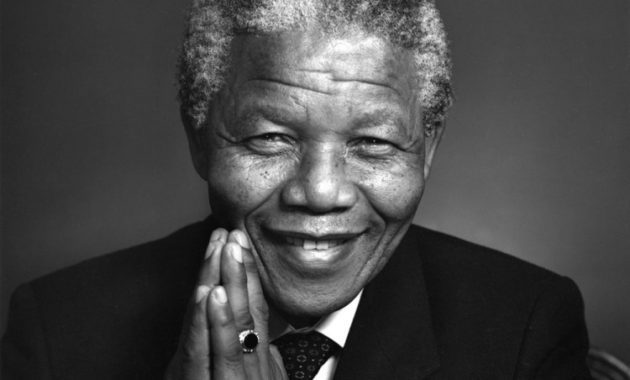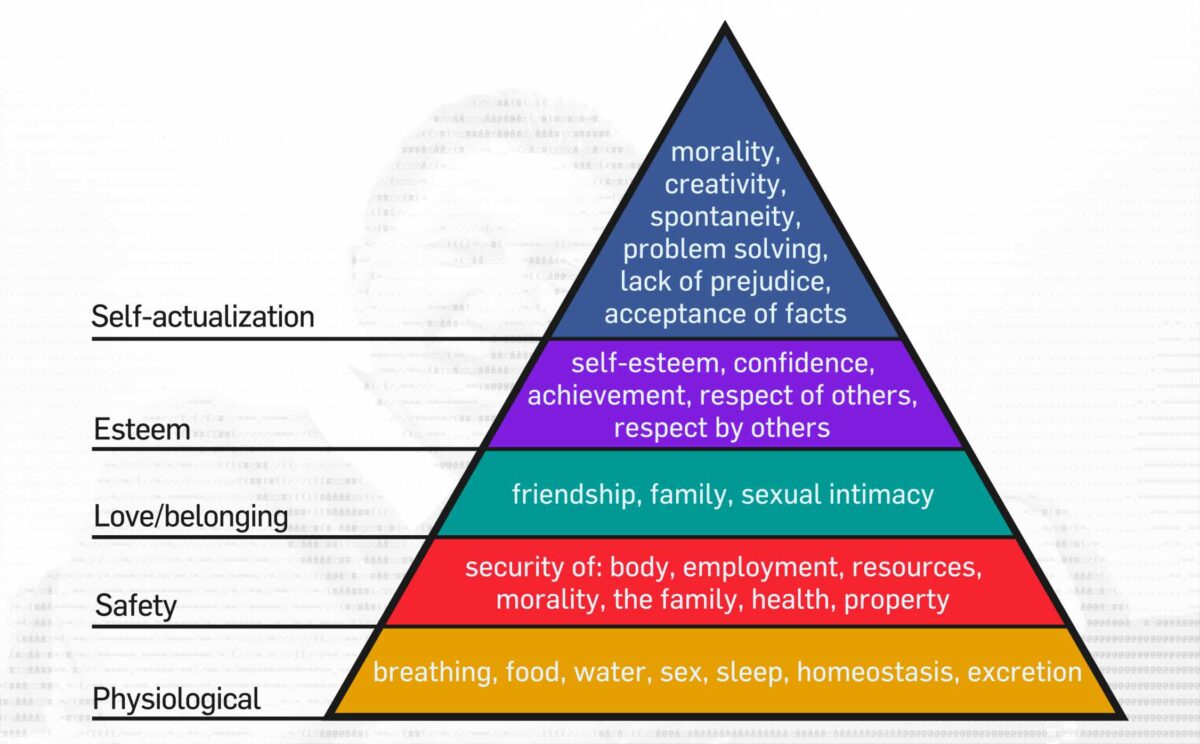Abraham Maslow was a humanist. This is what makes Abraham Maslow believe in the statement that every individual has a desire to make himself at the top level. However, to reach this level there are other levels that must be met.
Maslow’s Hierarchy of Needs Theory contains the level of needs that must be met by each individual. Individuals referred to in this theory are humans. As We knows, humans are weak creatures and will certainly continue to develop to find their strengths in an effort to meet their needs.
This theory contains five levels of needs that must be met at each level. The level of needs begins with basic needs such as human physiological needs, the need for security, the need to feel love, the need for achievement, and the top level is the need for self-actualization. This hierarchy of needs is formed in the form of a triangle with the base having a wider aspect coverage than the cone part. The following is an explanation and sequence of the Hierarchy of Needs Theory by Abraham Maslow.
Maslow’s Hierarchy of Needs Theory contains the level of needs that must be met by each individual. Individuals referred to in this theory are humans. As We knows, humans are weak creatures and will certainly continue to develop to find their strengths in an effort to meet their needs.
This theory contains five levels of needs that must be met at each level. The level of needs begins with basic needs such as human physiological needs, the need for security, the need to feel love, the need for achievement, and the top level is the need for self-actualization. This hierarchy of needs is formed in the form of a triangle with the base having a wider aspect coverage than the cone part. The following is an explanation and sequence of the Hierarchy of Needs Theory by Abraham Maslow.

1. Basic Needs or Physiology
This first basic level need has a relationship with the needs of each individual’s body, both biological and physical needs. This very basic need must first be met so that humans can survive and move to the next level of needs. Physiological needs are human needs for oxygen, water, food, normal body temperature, sleep, homeostasis, sexual needs, and the like.

We can reason, an individual may not be able to meet the next level of needs if they have not met these basic physiological needs. It should be remembered that if one part of this physiological need cannot be met, it will automatically interfere with the achievement of the fulfillment of the needs at the next level. Of course this will be different from those who are destined to be rich, eating food is no longer their physiological need. However, they consider eating expensive food is their way of life.
2. The Need for Security
The second basic need is the need to always feel safe. An individual can move to the next level of need if he has successfully met the needs at the first level. Abraham Maslow explained that this need for security includes both physical and emotional security. Please note, the level of need at this level is more for the age range of children. This is because children still have a low level of alertness, so the assistance of older people is very much needed.
The need for security can be exemplified by examples such as the need for a sense of security from the dangers that will threaten, the need for protection from crime, the need for security from the threat of disease, the need for a sense of security from the dangers of natural disasters, and so on.
3. Social Needs (Love, Compassion, and Property Rights)
The third level needs are needs regarding social aspects that exist in society, such as the need to feel love, affection, and have the right to ownership of something. In this level, Abraham Maslow gives his opinion on the reasons why an individual seeks love. Abraham Maslow explained the background of this aspect because it is based on loneliness, loneliness, depression, stress, and excessive anxiety. There are two types of love possessed by an individual, namely D-Love or Deficiency and B-Love or Being.

Someone who feels love due to lack, it will be included in the type of D-Love. D-Love itself is often described as a love that makes oneself the focal point. While for B-Love is a form of assessment of an individual without any intention to take advantage of loved ones. Love is tangible like love that there is no desire to have, only supports the person to be better, and love that can have a positive impact on both parties, usually can be exemplified when an individual establishes a friendship with another individual or group.
In addition, the needs at the third level also include the need to be able to make friends with other individuals, form a family, socialize with a group, adapt to the surrounding environment, and be in the community. Like the previous needs, this third level of needs can be achieved if an individual succeeds in satisfying their needs at the previous level.
4. The Need for Appreciation
The next level of needs, namely the fourth level is the need for appreciation. The award referred to in this level of need is not always an award in the form of trophies or prizes. The meaning of the word appreciation here is self-esteem. Yep, every individual deserves their self-respect. Self-esteem can come from oneself or others. When the needs at this level can be met, it will automatically bring up the need to feel respect, to be trusted by others, and to stabilize oneself.
From that, we can conclude that this need is about rank, title, and profession. After an individual successfully fulfills it, the individual’s self-confidence will automatically skyrocket. A high level of self-confidence will certainly affect the social role of the individual. On the other hand, if these needs are not met, it will have serious impacts such as depression, anxiety, stress, lack of self-confidence, inferiority, feeling useless, and so on.

Self-esteem is divided into two forms, namely:
4.1 Forms of self-respect
having confidence in oneself, achieving achievements, being an independent person, having the ability, and competent competence.
4.2 Forms of appreciation from others
get status, titles, ranks, positions, become famous people, get appreciation for the hard work done, get praise, be judged well by others.
5. The Need for Self-Actualization
The highest level needs, namely the need for self-actualization. This need can be achieved if an individual successfully fulfills the four previous needs. Self-actualization can be interpreted as a real form to reflect the hopes and desires of an individual towards himself. In the description of self-actualization given by Abraham Maslow, this self-actualization acts as an individual’s need to decide their desires.
If We is still confused with the image of self-actualization, then we will give examples such as if an individual is a musician then he should go to make music, if he is a dancer then he has to move his body, if he is an educator then he should look for someone to be educated, and much more.
Self-actualization is not an easy thing to do. Because in meeting this need, an individual must get sufficient support from various parties. The impact that occurs if the needs at this final level are not met are the emergence of feelings of discomfort, anxiety, tension, inferiority, and so on.

In the following, we will explain more clearly about Abraham Maslow‘s description of the need for self-actualization.
5.1 Acceptance and Realism
someone who manages to understand themselves and accept all the good facts about themselves, others, and their environment.
5.2 Problem Centering
have a person who likes to help others, can find the best solution for the problems at hand. Although the matter is beyond the control and personal environment of the individual. have the motivation to always be responsible and always prioritize social ethics.
5.3 Spontaneity
able to act spontaneously and can adapt to these conditions.
5.4 Autonomy and Solitude
have a higher level of freedom and privacy.
5.5 Continued Freshness of Appreciation
a person who achieves self-actualization looks at the world with a gaze full of gratitude and unstoppable admiration. They will be easy to be grateful even if they only receive or experience small things, they are also very easy to make every incident in their life as their inspiration and source of pleasure.
5.6 Peak Experiences
people who achieve self-actualization have their peak of pleasure which Abraham Maslow used to call joy. They will view everything that has happened to him in a positive light. Every good or bad incident is used wisely as a lesson, inspiration, experience, and strength to be better and better.

In addition, according to Abraham Maslow, someone who has achieved self-actualization has several qualities that are different from other individuals. The following are the qualities of individuals who successfully achieve self-actualization, such as:
- truth,
- goodness,
- beauty,
- wholeness,
- dichotomy,
- aliveness,
- unique,
- perfection,
- necessity,
- completion,
- justice,
- orders,
- simplicity,
- richness,
- effortless,
- playfulness,
- self-sufficiency.
It turns out that there is a lot of information that we get in just one theory. This theory has a conclusion, essentially to achieve the highest level of needs, an individual must first meet the basic level of needs. Well, then can reach the highest level of need.
